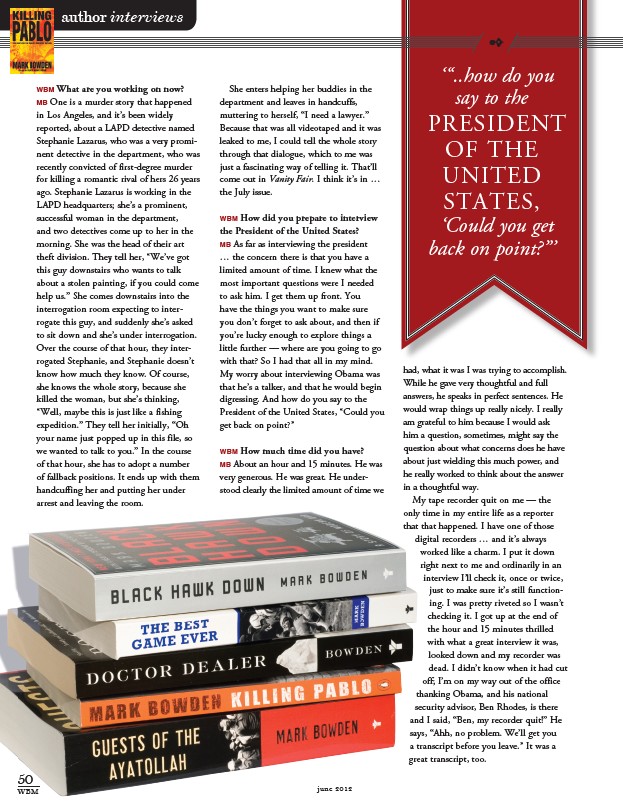
WBM What are you working on now?
MB One is a murder story that happened
in Los Angeles, and it’s been widely
reported, about a LAPD detective named
Stephanie Lazarus, who was a very prominent
detective in the department, who was
recently convicted of first-degree murder
for killing a romantic rival of hers 26 years
ago. Stephanie Lazarus is working in the
LAPD headquarters; she’s a prominent,
successful woman in the department,
and two detectives come up to her in the
morning. She was the head of their art
theft division. They tell her, “We’ve got
this guy downstairs who wants to talk
about a stolen painting, if you could come
help us.” She comes downstairs into the
interrogation room expecting to interrogate
this guy, and suddenly she’s asked
to sit down and she’s under interrogation.
Over the course of that hour, they interrogated
Stephanie, and Stephanie doesn’t
know how much they know. Of course,
she knows the whole story, because she
killed the woman, but she’s thinking,
“Well, maybe this is just like a fishing
expedition.” They tell her initially, “Oh
your name just popped up in this file, so
we wanted to talk to you.” In the course
of that hour, she has to adopt a number
of fallback positions. It ends up with them
handcuffing her and putting her under
arrest and leaving the room.
She enters helping her buddies in the
department and leaves in handcuffs,
muttering to herself, “I need a lawyer.”
Because that was all videotaped and it was
leaked to me, I could tell the whole story
through that dialogue, which to me was
just a fascinating way of telling it. That’ll
come out in Vanity Fair. I think it’s in …
the July issue.
WBM How did you prepare to interview
the President of the United States?
MB As far as interviewing the president
… the concern there is that you have a
limited amount of time. I knew what the
most important questions were I needed
to ask him. I get them up front. You
have the things you want to make sure
you don’t forget to ask about, and then if
you’re lucky enough to explore things a
little further — where are you going to go
with that? So I had that all in my mind.
My worry about interviewing Obama was
that he’s a talker, and that he would begin
digressing. And how do you say to the
President of the United States, “Could you
get back on point?”
WBM How much time did you have?
MB About an hour and 15 minutes. He was
very generous. He was great. He understood
clearly the limited amount of time we
50
WBM june 2012
‘“..how do you
say to the
President
of the
United
States,
‘Could you get
back on point?”’
had, what it was I was trying to accomplish.
While he gave very thoughtful and full
answers, he speaks in perfect sentences. He
would wrap things up really nicely. I really
am grateful to him because I would ask
him a question, sometimes, might say the
question about what concerns does he have
about just wielding this much power, and
he really worked to think about the answer
in a thoughtful way.
My tape recorder quit on me — the
only time in my entire life as a reporter
that that happened. I have one of those
digital recorders … and it’s always
worked like a charm. I put it down
right next to me and ordinarily in an
interview I’ll check it, once or twice,
just to make sure it’s still functioning.
I was pretty riveted so I wasn’t
checking it. I got up at the end of
the hour and 15 minutes thrilled
with what a great interview it was,
looked down and my recorder was
dead. I didn’t know when it had cut
off; I’m on my way out of the office
thanking Obama, and his national
security advisor, Ben Rhodes, is there
and I said, “Ben, my recorder quit!” He
says, “Ahh, no problem. We’ll get you
a transcript before you leave.” It was a
great transcript, too.
author interviews